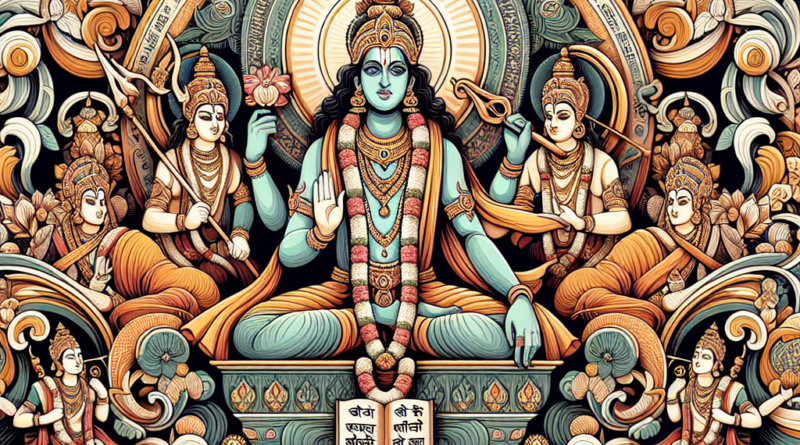Sacred Geeta Slokas: Ancient Wisdom in Translation
Title: The Eternal Wisdom of Geeta Slokas: A Cultural and Spiritual Beacon in Hindu Philosophy
The Bhagavad Gita, often referred to as the Geeta, is one of the most revered texts in Hindu philosophy and spirituality. Comprising 700 verses or slokas, it is a sacred scripture that encapsulates profound teachings on duty, righteousness, and the nature of existence. Written in Sanskrit, the language of ancient India, the Geeta continues to hold immense cultural and spiritual significance in the lives of millions of Hindus around the world.
Historical Context:
The Bhagavad Gita is a part of the Indian epic Mahabharata, which dates back to around 400 BCE to 200 CE. The epic recounts the Kurukshetra War between the Pandavas and the Kauravas, two warring factions of the Kuru dynasty. It is in the midst of this epic battle that Lord Krishna imparts the teachings of the Geeta to Prince Arjuna, who is plagued by doubt and moral dilemma about fighting in the war.
The Geeta addresses fundamental questions about the nature of life, duty, and righteousness. It emphasizes the concept of dharma, or duty, and the importance of performing one’s duties selflessly and without attachment to the results. The text also delves into the nature of the self, the impermanence of the physical body, and the eternal essence that transcends life and death.
Geeta Slokas in Sanskrit and English:
One of the most well-known and revered slokas from the Bhagavad Gita is:
“कर्मण्येवाधिकारस्ते मा फलेषु कदाचन।
मा कर्मफलहेतुर्भूर्मा ते सङ्गोऽस्त्वकर्मणि॥”
Translation: “You have a right to perform your prescribed duties, but you are not entitled to the fruits of your actions. Never consider yourself to be the cause of the results of your activities, and never be attached to not doing your duty.”
This verse encapsulates the essence of selfless action and detachment from the outcomes of one’s actions. It highlights the importance of performing one’s duties diligently and with a sense of responsibility, without being swayed by desires for personal gain or recognition.
Another significant sloka from the Geeta is:
“यदा यदा हि धर्मस्य ग्लानिर्भवति भारत।
अभ्युत्थानमधर्मस्य तदात्मानं सृजाम्यहम्॥”
Translation: “Whenever there is a decline in righteousness and an increase in unrighteousness, at that time I manifest myself on earth.”
This verse conveys the idea of divine intervention in times of moral and spiritual crisis. It signifies the belief that the cosmic order is maintained by the periodic descent of divine beings to restore balance and righteousness in the world.
Cultural and Spiritual Significance:
The Bhagavad Gita holds immense cultural significance in Indian society, serving as a guiding light for ethical and moral conduct. It has inspired generations of scholars, philosophers, and spiritual seekers to delve deeper into the mysteries of life and the self. The teachings of the Geeta have influenced various aspects of Indian culture, including art, literature, music, and dance.
In the realm of spirituality, the Geeta is revered as a spiritual manual that offers practical guidance for navigating the complexities of human existence. Its teachings on selflessness, duty, and devotion have resonated with people from all walks of life, transcending boundaries of caste, creed, and nationality.
Contemporary Relevance:
In today’s fast-paced and materialistic world, the teachings of the Bhagavad Gita hold profound relevance for individuals seeking inner peace and spiritual fulfillment. The emphasis on selfless action, detachment from outcomes, and devotion to duty can serve as a beacon of light in times of uncertainty and turmoil.
The Geeta’s message of equanimity, resilience, and moral courage is particularly pertinent in the face of modern challenges such as social injustice, environmental degradation, and moral decay. By internalizing the timeless wisdom of the Geeta, individuals can cultivate a deeper sense of purpose, compassion, and spiritual awareness in their lives.
In conclusion, the Geeta slokas embody the eternal wisdom of Hindu philosophy, offering profound insights into the nature of existence and the path to spiritual liberation. As a cultural and spiritual beacon, the Bhagavad Gita continues to inspire and enlighten seekers of truth and wisdom across the globe, transcending the boundaries of time and space.

